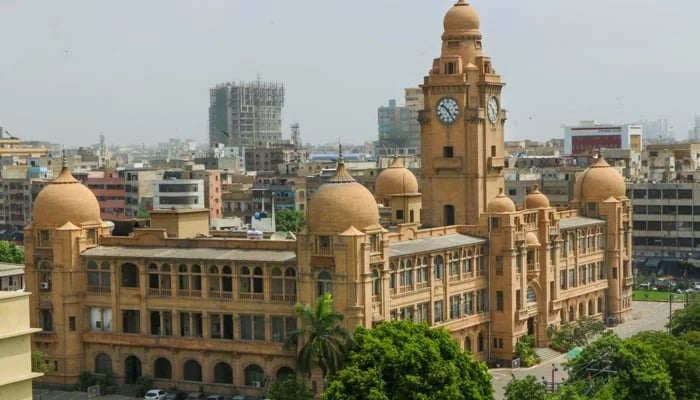Punjab Urban Unit helping KMC develop Climate Action Plan
C40 is a global network comprising nearly 100 mayors from leading cities worldwide united in addressing the climate crisis
KARACHI: The C40 and United Nations Development Programme (UNDP) are collaborating to develop a Climate Action Plan (CAP) for Karachi with the goal of achieving ‘net zero emissions’ by 2050.
The Punjab Urban Unit, serving as the implementation partner, is overseeing the plan’s execution in close collaboration with the Karachi Metropolitan Corporation (KMC) and Mayor Murtaza Wahab.
C40 is a global network comprising nearly 100 mayors from leading cities worldwide united in addressing the climate crisis. Their approach is science-based and inclusive aiming to halve member cities’ emissions by 2030 and limit global heating to 1.5°C, while fostering healthy, equitable and resilient communities.
Among the 10 South Asian cities in the C40 network are Ahmedabad, Amman, Bengaluru, Chennai, Delhi, Dhaka, Dubai, Kolkata, Mumbai, and Karachi. In 2016, nations worldwide signed the Paris Agreement, a legally binding treaty on climate change, with 196 parties adopting the agreement at the UN Climate Change Conference (COP) in Paris.
The agreement’s primary objective is to limit the global average temperature increase to well below 2°C above pre-industrial levels, with efforts to further restrict it to 1.5°C. Parties also pledged to enhance their capacity for climate change adaptation and resilience, a commitment echoed in the manifestos of numerous political parties before the 2024 general elections.
Nearly 70 per cent of C40 cities are already experiencing the effects of climate change. Consequently, each city within the network is tasked with developing a CAP aligned with the Paris Agreement’s objectives, aiming to cap global warming at 1.5 degrees Celsius.
The CAP is a strategic document that demonstrates how a city will deliver on its commitment to address climate change. It has four goals in the context of the Paris Agreement.
The first goal is to develop a roadmap to deliver an emission-neutral city by 2050 and set an ‘interim target or carbon budget’. This means reducing overall emissions from heating buildings, operating vehicles and running industries.
The second goal is to demonstrate how the city will adapt and improve its resilience to climate hazards. The third goal is community engagement about the CAP, outlining the social, environmental and economic benefits expected from the plan implementation and planning an equitable distribution of the CAP’s benefits among the city’s population.
The CAP framework has three pillars. The first pillar is about commitment and collaboration on the governance and coordination of the CAP. It emphasises working closely with national policies and city authorities and keeping the businesses on board.
The C40 framework document says that this pillar can be achieved through a signed legislative commitment with cross-political and/or multi-sector support for delivering the plan and objectives of the Paris Agreement or a signed legislation.
The second pillar is about the challenges and opportunities of the city’s conditions including baseline carbon emissions and climate risk factors. The third pillar is about the acceleration and implementation of the CAP through the monitoring and evaluation process.
In November 2023, the UNDP Pakistan in collaboration with its partners at C40 — KMC and PUU — conducted the Rapid Strategic Appraisal and Visioning Workshop to commence the development of a Climate Action Plan for Karachi city (K-CAP).
The Karachi mayor said he had full commitment to prioritise and accelerate climate actions for a low-carbon and climate-resilient urban development in Karachi through K-CAP. “With this project, evidence-based action planning is expected to manage all facets of sustainable development and provide climate actions that are fair, equitable and beneficial for all, as well as meet the commitments made under the Paris Agreement and NDCs,” he said.
-
 Oil Price Jumps, Stocks Fall After US And Israel Strike Iran
Oil Price Jumps, Stocks Fall After US And Israel Strike Iran -
 Demi Lovato Admits Younger Self 'would Never Believe' Her Life Now: 'It Can Get Better'
Demi Lovato Admits Younger Self 'would Never Believe' Her Life Now: 'It Can Get Better' -
 Gunman Identified After Texas Bar Shooting Leaves 3 Dead, 14 Injured
Gunman Identified After Texas Bar Shooting Leaves 3 Dead, 14 Injured -
 Meghan Markle Was Bad Mouthed By Royals On King Charles Coronation
Meghan Markle Was Bad Mouthed By Royals On King Charles Coronation -
 'Bridgerton' Season 4: Showrunner Talks About Violet's Steamy Romance
'Bridgerton' Season 4: Showrunner Talks About Violet's Steamy Romance -
 John Tesh Recalls ‘uncomfortable’ Backlash Over ’70s Romance With Oprah Winfrey
John Tesh Recalls ‘uncomfortable’ Backlash Over ’70s Romance With Oprah Winfrey -
 Meghan Markle, Prince Harry Problem Was Not ‘work’ During Time With Royals
Meghan Markle, Prince Harry Problem Was Not ‘work’ During Time With Royals -
 Meta Strikes Multi-billion-dollar AI Chip Deal With Google: Will The New Collaboration Pay Off?
Meta Strikes Multi-billion-dollar AI Chip Deal With Google: Will The New Collaboration Pay Off? -
 Gracie Abrams Breaks Silence After Losing 2026 BRIT Award
Gracie Abrams Breaks Silence After Losing 2026 BRIT Award -
 Deon Cole Takes Swipe At Nicki Minaj In Mock Prayer During NAACP Image Awards Monologue
Deon Cole Takes Swipe At Nicki Minaj In Mock Prayer During NAACP Image Awards Monologue -
 Jennifer Garner Reveals The Actress Who 'carried Through Things'
Jennifer Garner Reveals The Actress Who 'carried Through Things' -
 Shamed Andrew ‘awful’ Time As Trade Envoy Is Laid Bare By Insider
Shamed Andrew ‘awful’ Time As Trade Envoy Is Laid Bare By Insider -
 Belgium Seizes Suspected Russian Shadow Fleet Tanker
Belgium Seizes Suspected Russian Shadow Fleet Tanker -
 Liza Minelli Makes Bombshell Claim About Late Mother Judy Garland’s Struggle With Drugs
Liza Minelli Makes Bombshell Claim About Late Mother Judy Garland’s Struggle With Drugs -
 Shipping Giant Maersk Halts Suez Canal, Bab El-Mandeb Sailings Amid Escalating Conflict
Shipping Giant Maersk Halts Suez Canal, Bab El-Mandeb Sailings Amid Escalating Conflict -
 Matthew McCoughaney Reveals One 'gift' He Achieved With Losing Nearly 50 Pounds
Matthew McCoughaney Reveals One 'gift' He Achieved With Losing Nearly 50 Pounds




